In this article we will continue our discussion of the Triad by moving into the symbolic significance of the Triad related to Wholeness and the Divine or Holy Trinity.
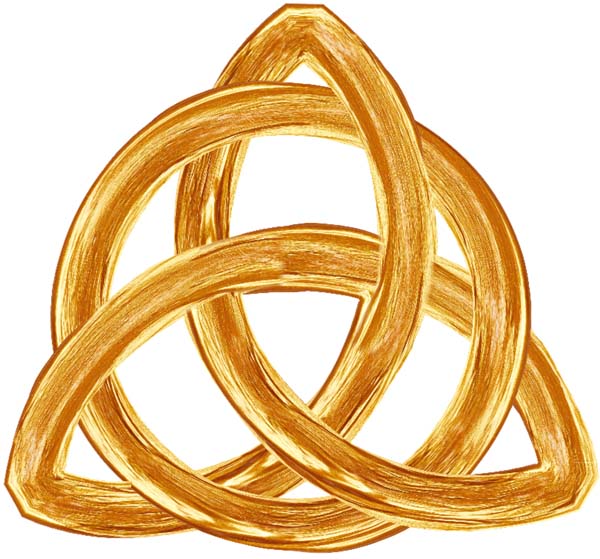
Threeness as Wholeness
The Triad symbolizes:
- Wholeness
- Plurality
- Supremacy
- Completion through an embracing synthesis (thesis, antithesis, synthesis)
Plato writes in Timaeus 31c, “It’s impossible for any two things to form a proper structure without the presence of a third thing; there has to be some bond to mediate between the two of them and bring them together.”

Religious rituals call for repeating a phrase three times, three prayers, or chanting three times. This 3-time repetition or 3-part ritual is intended to make an event happen – to make it whole, or to bring it to manifestation and completion.
“In becoming whole the Triad, threeness, remembers unity and expresses its yearning to return to the state of the Monad.”1
Three announces wholeness and completion through an embracing synthesis, yet still containing the principles of the 1, meaning that rather than achieving completion in and of itself, it achieves cycles of completion: birth, growth, death, for instance…ever-repeating.

Esoterically this represents the quality of the Universe that is in a constant state of becoming…never-ending cycles of spirals in all aspects of reality. All is Motion. All is Change. All is Evolution.

Threeness as Balance & Harmony
Opposites are balanced by a third, mediating element.
The Triad reconciles conflict. It heals the split of polarity. It transforms separate parts into a complete and successful whole.

Three represents a neutral, binding, balancing, transforming presence.
Through Harmony, we can move through the door of Polarity to Unity.

Unity through Harmony is a crucial philosophical idea. To ‘return’ to Unity, we cannot escape polarity. We must go back through the door of Polarity by finding Harmony. The three brings us back to the One.
Harmony creates balance. Balance creates Peace.

Peace allows for empathy. Empathy breeds compassion. Compassion lives in Unity.
Keith Critchlow reminds us that Harmony “is often associated with great peacefulness, so becoming the inspiration of calmness. When the Soul is in harmony with itself we call it ‘peace of mind.”
“Surely we have differences, but we are also embraced by sameness. It is recognizing the conceptual balance between them which can be called the harmony of being.”2

“The process of distinguishing, separating, and then marrying opposite elements is properly the task of the alchemist, and the way of thinking behind all branches of ancient science was essentially alchemical.”3
The Triad Synthesizing a New Whole
“No enduring resolution of any kind is possible without three aspects, two opposites and a neutral, binding, balancing, arbitrating, transforming presence. Knowing how to choose the third factor means the difference between a conflict’s resolution and is perpetuation. The third element, if properly chosen achieves a previously unknown level of experience,one of balance and completion.”4

See the below chart from Michael Schneider’s A Beginner’s Guide to Constructing the Universe
| Opposite | Poles | Binding Element | New Whole |
| Seller | Buyer | Money | Commerce |
| Man | Woman | Love | Home |
| Water | Flour | Fire | Bread |
| Prosecution | Defense | Judge | Trial |
| Cook | Eaters | Food | Meal |
| Artist | Medium | Inspiration | Art |
| Projector | Screen | Film | Movie |
| Management | Labor | Arbitrator | Mediation |
| Wick | Wax | Flame | Candle |
| “North” Pole | “South” Pole | Field | Magnet |
| Negative | Positive | Wire | Electric Circuit |
| Reactant | Reagent | Catalyst | Chemical Process |
| Left Pan | Right Pan | Central Hinge | Balance Scales |
| Executive | Legislative | Judicial | Just Government |
“Harmony itself is the finest relationship that can be nourished between two entities. It both honors their differences yet binds them into one.” – Keith Critchlow
The Triad in Culture, Religion, & Myth
The symbolism of the Triad recurs often across cultures in religion, myth, superstition, fairy tales, mysticism, magic, folklore, proverbs and fables.
Some of these include the:
- Three knights
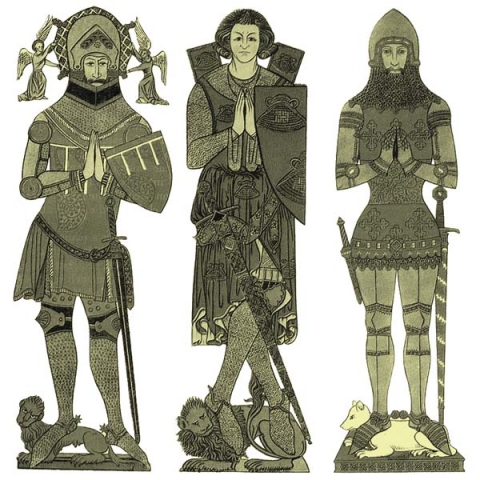
Credit: Hasted’s Historical and Topographical Survey of Kent (published in 1793)
- Three wise men
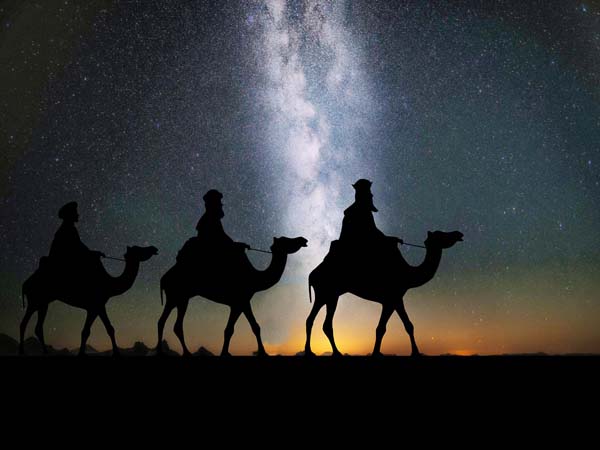
- Three Fates – Spinner (Clotho), Measurer (Lachesis), Cutter (Atropos)

The Three Fates Clotho, Lachesis, and Atropos by Giorgio Ghisi and Giulio Romano, 1558-59
- Three Graces – Splendor (Aglaia), Mirth (Euphrosyne), Good Cheer (Thalia)
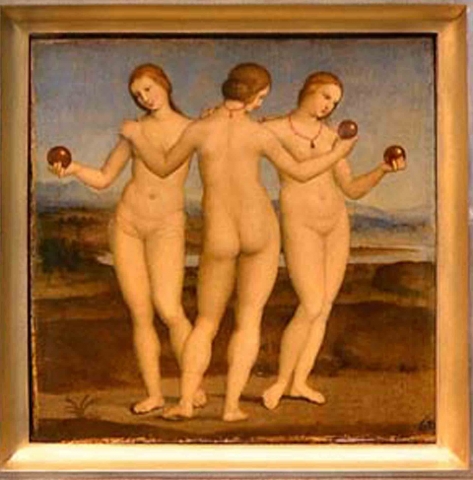
The Three Graces by Raphael, 1503-05
- Three Furies – Avenging Murder (Tisiphone), Jealousy (Megaera), Unceasing Anger (Alecto)
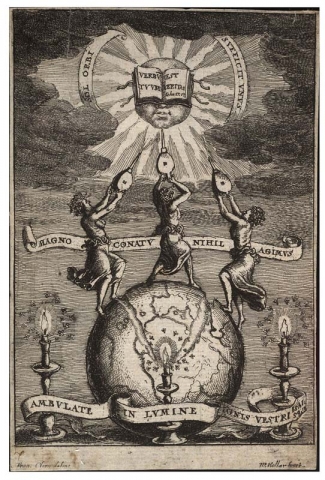
- Three Charities – similar to the three Graces
- Greek goddess Harmonia (“fitting together”) daughter of Aphrodite (Love) and Ares (War)
- Three wishes from a genie
- Three Bears (too hot, too cold, just right), Three Blind Mice, Three little pigs
- Tales of three gifts, days, jewels, rings, goblets, arrows, swords, keys, gates, paths, songs, magic words, rivers, judges, challenges, and tasks
Goals are actualized after two failures.
Obstacles are overcome on the third trial.

Hero’s Journey Trilogy
“In narratology and comparative mythology, the monomyth, or hero’s journey, is the common template of a broad category of tales that involve a hero who goes on an adventure, and in a decisive crisis wins a victory, and then comes home changed or transformed.”5
On a higher level the Hero’s Journey is about the transformation of the soul and learning to transform weaknesses into strengths in order to help the individual, entire society, and whole world rise to higher heights of peace, unity, abundance and prosperity for all.
The Hero’s Journey is a Trilogy:
Separation
The hero lives in the ordinary world and receives a call to go on an adventure.
The hero is reluctant, but is helped by a mentor figure.

Initiation
The hero traverses the threshold to the unknown or “special world” where they face tasks or trials, either alone or with the help of others.
Eventually the hero reaches the ‘innermost cave’ or central crisis of the adventure where they must undergo the ordeal to overcome the main obstacle or enemy, undergoing apotheosis and gaining the reward.
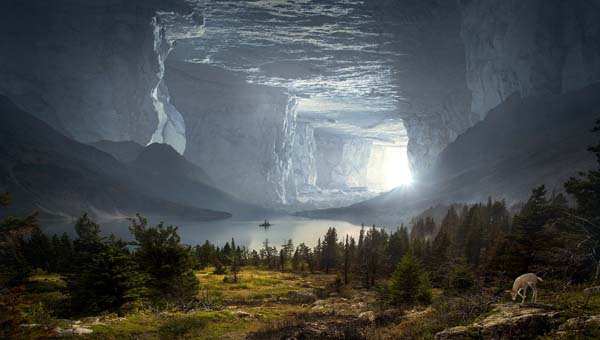
Return
The hero must return to the ordinary world with the reward.
They may be pursued by guardians of the special world, or they are reluctant to return and may be rescued or forced to return by outside intervention.
The hero returns with the reward which is useful for the benefit of humanity.
The hero is transformed by the adventure and gains wisdom or spiritual power over both worlds.

“Three…represents the essential tendencies inherent in the universal spirit: this is expressed in triangular form as the descending movement away from the first principle, the horizontal expansion and finally the returning ascent back to the first principle.”6
Three Reflections of Unity
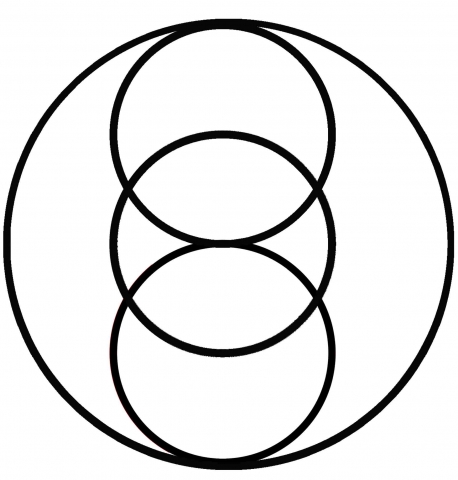
The uppermost sphere is heaven, the lowest is earth and the central linking sphere is the consciousness of mankind.
Keith Critchlow writes, “These three primordial reflections of unity have been described variously as:
- the gods, the ancestors and society;
- or as the upper world, the underworld and ‘our’ world;
- or the upper as the sphere of ideas and pure being (the symbolic), the lower as the diabolic world where order is continually dissolved into less integrated states, and the centrally balancing sphere of human consciousness.”7
The Three Reflections of Unity as the Archetypal Relationship between Man and the Cosmos
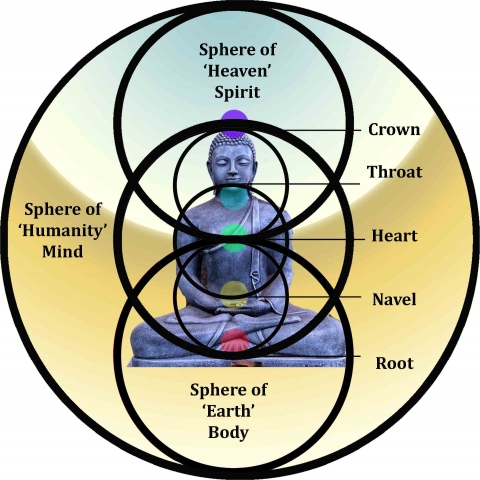
“The three larger circles are centered on the root symbolizing the earth, the heart symbolizing mankind, and the crown of the head symbolizing heaven.”8
The inner circles represent the subtle body (chakras).
The centers lie on the navel, heart and throat, with the base of the lower circle as the root center and the top of the upper circle as the crown chakra.
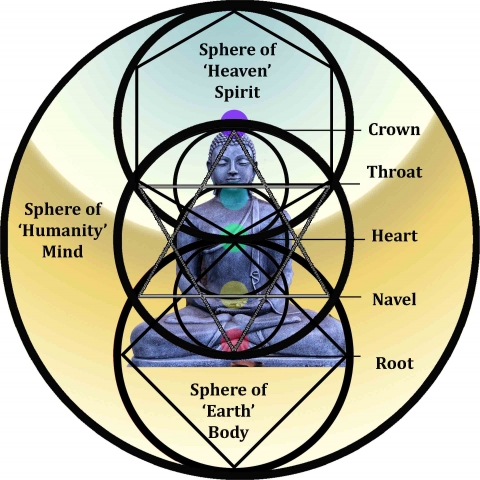
The Earthly realm is represented as a square (the four elements).
The Realm or circle of mankind is represented by the hexagon (the perfect number 6).
“The equilateral triangle can take up two positions in the diagram [the star tetrahedron] which relates symbolically to a ‘shift’ in the center of consciousness in the heavenward direction.”9

The Holy Trinity of Divinity

Perhaps the most well-known reference to the symbolism of the Triad occurs in the concept of the Holy Trinity. The triangle in this case represents a singular formal and functional unity rather than a group of separate entities. The character of each element is completely dependent upon their bonded triad. This references many different belief systems:
- Body, Mind, Spirit
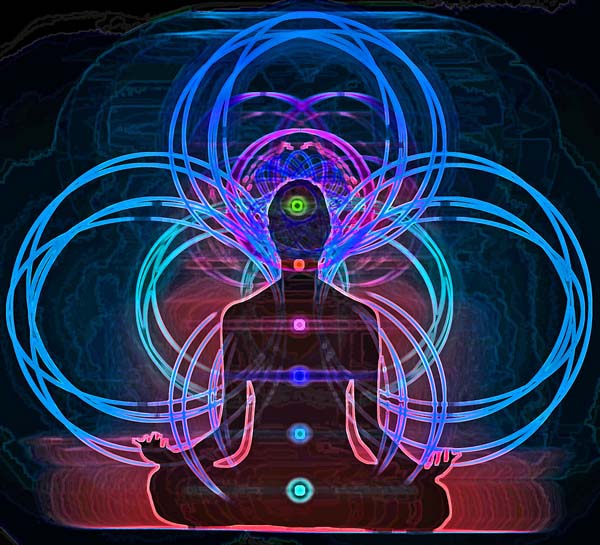
- Geometry, Sound, Light
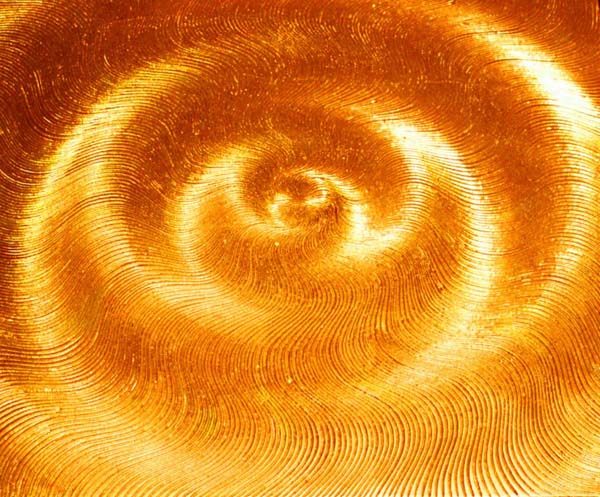
- Consciousness, Time, Space
- As Robert Lawlor states, “One may think of Time and Space as the windows and walls of a shadowy domicile dreamed by an infinite Consciousness in its eternal game of becoming imaginable to itself.”
- Heaven, Humanity, Earth – The Taoist “Great Triad”
- The Chinese saw Heaven, Humanity and Earth as the essential triad of consciousness. “This means taking into account that which is above human understanding (the domain of pure unchanging principles) as the Heavenly, next that which is within human rational understanding as the basis of sensory experience and thought. Finally the Earthly, the behavior of the physical and natural world, the Heavenly and Earthly being mediated and balanced by Human consciousness. It is this Grand Oriental Triad that the ancient Chinese believed held the purpose of life, namely mediation which is Being.”10

- Father, Son, Holy Ghost – Christian Holy Trinity

St. Josaphat Catholic Church apse mural, Detroit, Michigan
- Hindu Trimurti: Brahma the Creator, Vishnu the Preserver, Shiva the Destroyer
The story of Vishnu is an excellent example of a symbolic telling of the cosmic patterns and durations of the alternating dynamics of creation and destruction. As Robert Lawlor writes, “I wish to emphasize that Vishnu is not a god. He is a personification of one of the 3 essential powers and principles of Universal Consciousness upon which the ever-dynamic process of creation is founded:
- The initial, animated, invigorated conceptualization (Brahma)
- The continuity of maintaining a proceeding integration of consistency and change (Vishnu)
- The necessity of death, destruction, dispersal and return to the initial Consciousness, prior to a transformation in harmony with achieving the purpose and goal of the creation process (Shiva).”
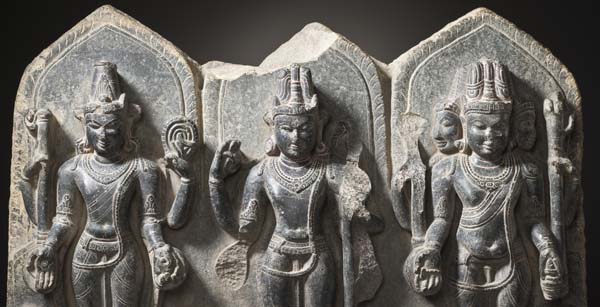
India, Bihar, Terai region, 10th century
- The Hindu Triad can also be seen as the:
- The movement towards centrality
- The movement away from centrality
- Centrality
These three movements describe the all-important process/form of the torus:

- Hindu Vedic three gunas: sattva, rajas, tamas (purity, activity, inertia)
- Sattva – light; corresponds to the enlightening power of heaven
- Rajas – movement and corresponds to the horizontal axis in the human plane
- Tamas – inertia or darkness; related to the entropy of the underworld
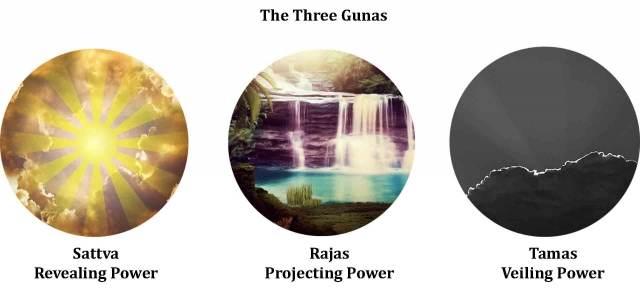
From another perspective, Robert Lawlor explains how the gunas are related to the ‘three postures’ and three levels of experience of humanity. “First, we have the standing, active, doing, fabricating, warring, trading, building man, called rajasic in Sanskrit; next the seated, thinking, symbol making and transmitting scientist, poet, sage, teacher, called sattvic in Sanskrit; and finally the kneeling, mystic, visionary yogi, the tamasic man in Sanskrit. There is no exclusion of one level of experience in favor of another: non-conceptual experience, extase, does not eliminate entase; the spiritual does not eliminate or devalue the intellectual or physical. From the point of view of Egyptian wisdom, no society could long endure without a constant flow of communication between these three postures.”
- Three Jewels of Buddhism: the Buddha, Dharma (the teachings), the Sangha (spiritual community)
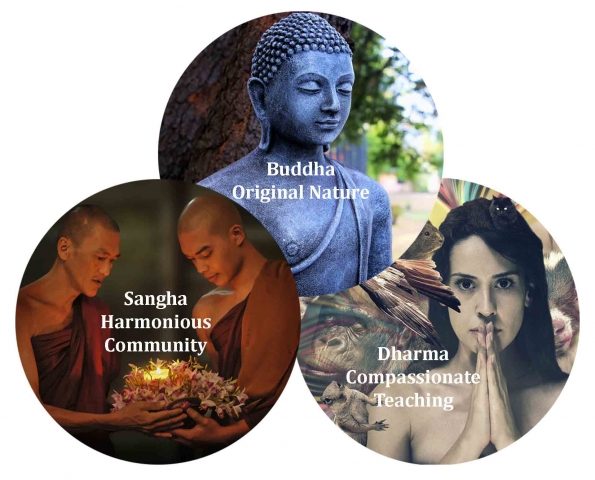
- Three Pure Ones of Taoism: “The Tao produces One; One produces Two; Two produced Three; Three produced All things.”
- Triple Goddess of Wicca – Maiden, Mother, Crone
- Three Patriarchs of Judaism – Abraham, Isaac, Jacob
- Three virtues of Zoroastrianism – good thoughts, good words, good deeds
- Plato’s constitutional triad of the universe: sameness, difference (otherness) and essence (being)
- Three Aspects of Knowledge (Greek) – The Knower, Knowing, the Known
- Plutarch: nous (divine intellect), psyche (soul), soma (body)
- Three Stages of the Soul (Jainism) – External, Internal, Supreme
- Three Christian Qualities – Faith, Hope, Love
- Three evolutionary virtues (French) – Liberty, Equality, Fraternity
- Three Kingdoms – animal, vegetable, mineral


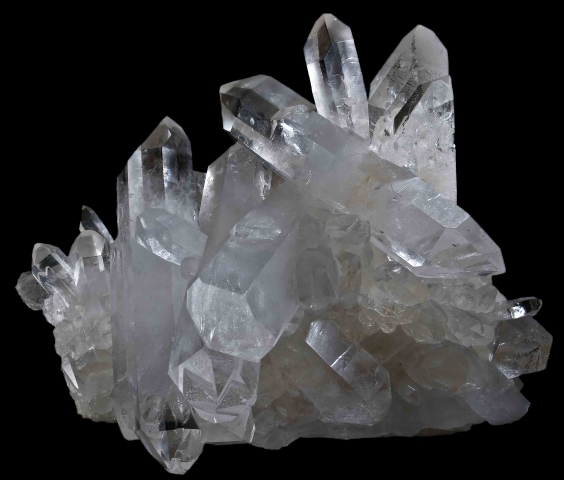
- Geometric triadic force of creation – All form begins with an inseparable, inexplicable triadic force, which the ancient Pythagorean geometers observed in their diagrams as:
- 1/φ2
- 1/φ
- 1
- These Golden Mean proportions, along with the set of proportions related to the triadic ratios of form:
- square root of 2 (√2)
- the square root of 3 (√3)
- the square root of 5 (√5)
- are all the proportions needed to form the complete world of the geometric solids.
- Three regular tilings – triangles, squares, hexagons

- Three primary colors
- red, green, blue (light)

-
- red, yellow, blue (pigment)

- Sacred Geometry construction:
- Compass – the unsleeping eye or sun above and its legs as rays of wisdom and beauty shining into our lives.
- Straightedge – directs energy and patterns of tension & movement; represents the will, intention and focus of consciousness.
- Pencil – makes the patterns visible.
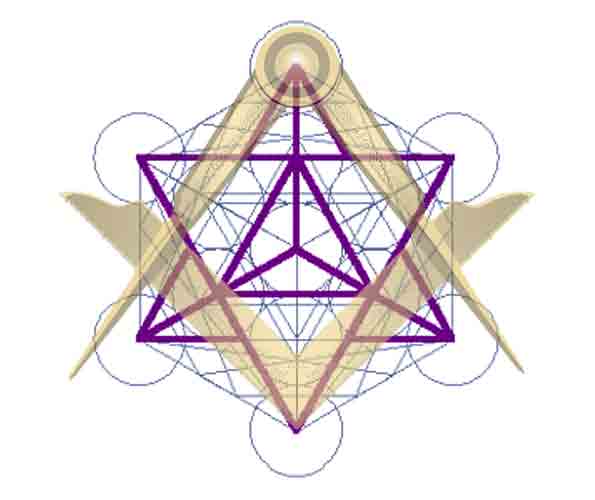
Michael Schneider writes, “Threeness shows us that we’re not separate from the rest of the universe but are literally braided into it; we are a complete whole living in a greater complete whole.”

The Trinity & Divinity
Manly Palmer Hall tells us in The Secret Teachings of All Ages that the origin of the Triad relates to the daily manifestations of the sun, the symbol of all Light.
This was seen in the rising, midday, and setting of the sun. 
Life was thus divided into growth, maturity, and decay. 
The ancients divided the solar orb into three separate bodies, analogous to the three centers of life in each individual constitution:
- the spiritual sun – illuminated the spiritual nature (spirit)
- the intellectual (soular) sun – redeems the intellectual nature by this true light of grace (mind)
- the material sun – unfolded and vitalized the physical body (body)

Pagan priests considered the solar system as a Grand Man.
The Triad then related to three centers of activity:
- the brain
- the heart
- the generative organs
“What the sun is to the solar system, the spirit is to the bodies of man; for his natures, organs, and functions are as planets surrounding the central life (or sun) and living upon its emanations.” 11
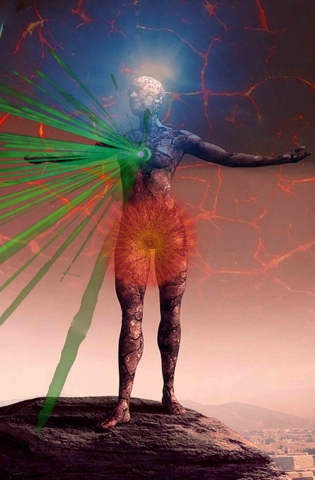
The Triangle and Its Dual

The upright triangle symbolizes humanity’s three-fold higher nature.
The inverted triangle symbolizes humanity’s three-fold lower nature.
Man’s Threefold higher nature relates to the human spirit of humanity. It is radiant, transcendent and united and forms the Divinity in man.
Man’s threefold lower nature reflects the light of his threefold divinity and bears witness to it in the physical world. This threefold lower nature is reflected in humanity’s:
- Physical organism
- Emotional nature
- Mental faculties
“These triangles symbolize the spiritual and material universes linked together in the constitution of the human creature, who partakes of both Nature and Divinity.” 12
“A person with only mortal desires and ambitions will remain in his mortal nature; however if a person is a lover of knowledge and of the true wisdom, then this person will have thoughts that are ‘immortal and divine’.”13

- Schneider, Michael, A Beginner’s Guide to Constructing the Universe, Harper Perennial, 1994
- Critchlow, Keith, The Hidden Geometry of Flowers: Living Rhythms, Form and Number, Floris Books, 2011
- Michell, John, The Dimensions of Paradise, Inner Traditions, 2nd edition, 2008
- Schneider, Michael, A Beginner’s Guide to Constructing the Universe, Harper Perennial, 1994
- https://en.wikipedia.org/wiki/Hero%27s_journey
- Critchlow, Keith, Time Stands Still, Brecourt Academic, 2nd edition, 2007
- ibid.
- ibid.
- ibid.
- Critchlow, Keith, The Hidden Geometry of Flowers: Living Rhythms, Form and Number, Floris Books, 2011
- Hall, Manly P, The Secret Teachings of All Ages, TarcherPerigree, 2003
- ibid.
- Critchlow, Keith, Time Stands Still, Brecourt Academic, 2nd edition, 2007
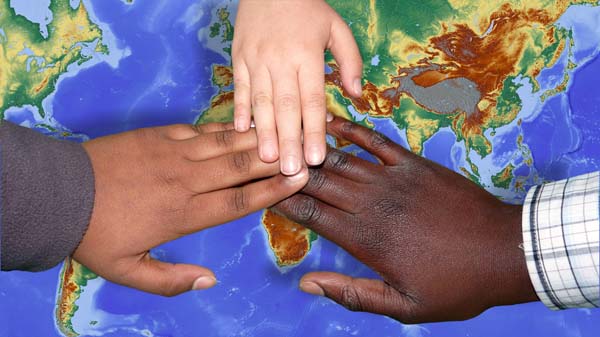
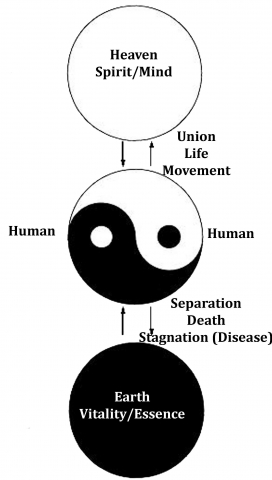


Recent Comments